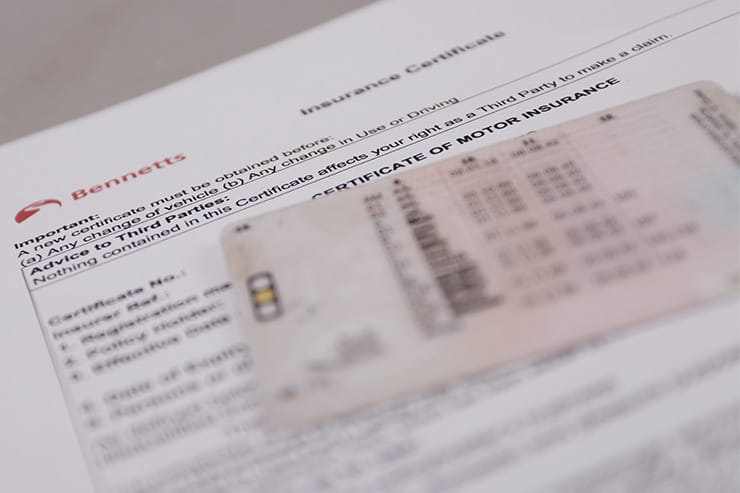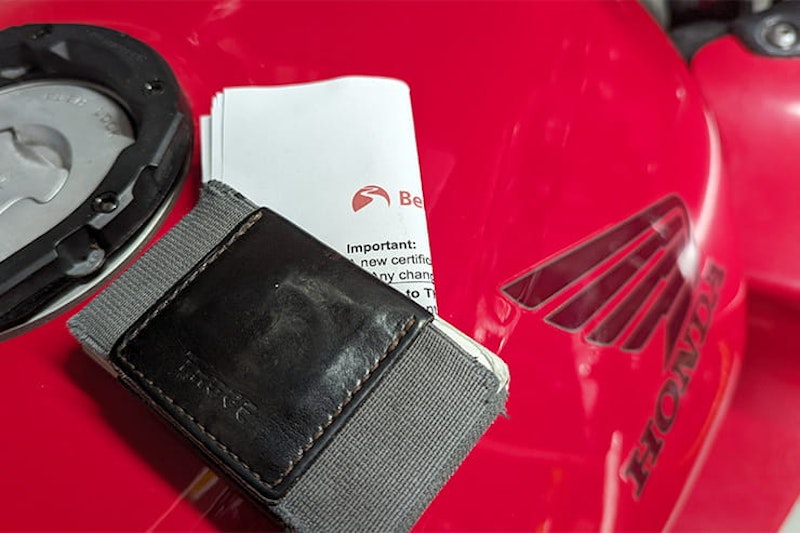What documents can the police demand if you’re stopped?
By Dave Yorke
Freelance journalist
04.12.2023
Do you remember the days of the humble 'producer'? In case you don't, it came about way before the police were using computers in everyday patrol situations and was actually called the 'HO/RT1' form... not very catchy, so most people called it a producer, and it was to require the recipient to produce their licence, insurance and MoT documents for inspection.
HO/RT1 stands for Home Office Road Traffic 1, with HO/RT2 being the form that was filled in when a rider or driver went to a police station to hand over their documents.
If someone was pulled over by the police at the roadside and officers wanted to check – among other things – a rider or driver's licence, insurance, and MoT, the HO/RT1 was a simple form that was issued if these documents weren't to hand.
The rider then scooted along to the police station of their choice with the relevant details within seven days of midnight from the day of the check, handed in their paperwork to be inspected and that was that. An easy job, except it wasn't always that quick, so let's go back to the start and see why it took so long and why modern technology is helping to speed things up...
Can the police stop you just to check your details?
The power to stop a person driving a motor vehicle on a road comes from Section 163 of the Road Traffic Act 1988. There doesn't have to be a specific reason, and a rider completes an offence if they fail to stop for the constable, who must be in uniform.
Things have moved on a bit from Dixon of Dock Green though, and there are variations of uniforms other than custodian helmets and trench coats.
Incidentally, the same power to stop also applies to pedal cyclists.
Can the police demand to see my licence, insurance and MoT?
Yes, once a rider or driver has been stopped, Section 164 of the Road Traffic Act enables the police to require production of a driving licence from anyone who is driving a motor vehicle on a road, or is suspected of driving a motor vehicle at the time of an accident owing to the presence of that vehicle. It also applies if an offence is suspected in relation to the use of a vehicle on a road.
Section 165 of the Road Traffic Act provides the same powers of production as section 164, but this time it's in relation to insurance and a test certificate.
Carrying your paperwork with you on the bike is far from convenient
Can I produce my documents a Police Station?
Yes, you can still request to attend a Police Station of your choice to produce your documents within seven days. Your choice though is being narrowed down as Police Forces close public enquiry offices to save costs, and deploy staff elsewhere. That means you'll be faced with a decreasing number of police stations that might not be entirely convenient for you. And with fewer police stations open to the public, the waiting time to get your documents checked could be longer.
Can't the police check all this at the roadside?
They can, and it's pretty much standard to check a driver's details at the scene.
With modern technology, police officers have access to your driving licence details, including the photo on a photocard licence and the details of insurance for the vehicle. The law was amended by the Motor Vehicles (Electronic Communication of Certificates of Insurance) order 2010 to allow the production of insurance certificates via a certificate on the insurer's website, by showing a policy on an email attachment, or by producing a legible printed copy.
The Police National Computer also holds the details of insurance, but if there's any discrepancy the police also have access to the Motor Insurers Bureau database, to check out the finer details.
Riders can also check their own details for free on the Motor Insurance database by using the askMID database here.
In relation to checking whether a motorcycle has a current MoT, police officers can check that at the roadside as well, but then anyone with access to the internet can check that on the Government's own MoT history website (which is also a great resource for checking the history of a used vehicle you're buying).
Things really have moved on; in the time that it used to take an officer at the roadside to ascertain if a rider had the relevant licence, insurance and MoT, and then fill out a form HO/RT1, they can now complete the checks electronically.
All being well, that should be the end of a rider's dealings with the cops. Officers don't have to wait for notification that a rider has produced their documents, and riders don't have to travel to a police station and wait in a queue for who knows how long for yet another member of police staff to check those details before travelling back home again.
It's a win all-round really but it's always best to check that the details you gave to the insurance company are reflected correctly on your insurance certificate as it just speeds things up at the roadside for everyone.
How to keep things simple if you get pulled over by the police
If you are pulled over by the police, either on your bike or in a car, be polite and respectful.
If the officer asks if you have your documents to hand, there are a few things that can make life a lot easier for you and the police, and avoid having to find a police station to produce paper documents:
Always carry your driver's licence as it's only the size of a credit card now (no more bulky paper licence) and it's a very handy form of ID for many things in life.
You don't need to carry your MoT certificate as it's easily checked online, but do make sure your bike has successfully been through the test in the past year! You can be fined up to £1,000 for driving a vehicle without a valid MoT, so consider setting up free text message reminders with the DVLA here.
Set up a folder in your email to save your insurance policy documents so they're easily to hand if you need them.
Carrying paper documents for your insurance isn't convenient on a bike (and it's not a good idea to keep personal paperwork in the car either), so a digital file is safer and more convenient.
Bennetts Motorcycle Insurance gives its customers the option of paperless digital policy documents, which are 100% secure and very easily accessible via your own web portal at ‘MyAccount' at the top right of the Bennetts Insurance home page, and being delivered by email. Hopefully you'll never need your documents for the police, but it's good to know you can access them immediately if you need to.
If you’d like to chat about this article or anything else biking related, join us and thousands of other riders at the Bennetts BikeSocial Facebook page.

